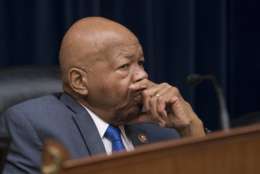Pay & Benefits
-
The idea of extending paid family leave for federal employees comes up year after year in Congress. Bob Tobias thinks it's long overdue, and in fact the policy is making its way into some union contracts already.
November 07, 2019 -
One of the key questions facing those eligible for Medicare is should they take part B and pay its premiums in addition to one of the Federal Employee Health Benefits Program plans?
November 04, 2019 -
Uncle Sam will spend a small fortune over the next couple of months making it easier for 2.8 million government workers to get the best health plan next year for the fewest amount of premium dollars.
October 31, 2019 -
Most of the 5.8 million workers, retirees and former feds with Thrift Savings Plan accounts have some of their retirement nest eggs in the G fund.
October 29, 2019 -
The Office of Personnel Management has launched Federal Long-Term Care Insurance Program 3.0, a new plan option and rate structure designed to keep premium rates under control amid a rapidly changing market.
October 25, 2019 -
Have you been monitoring the fascinating ups and downs of the C fund? Financial planner Arthur Stein has you covered.
October 23, 2019 -
Lawmakers, interest groups and military officials say more needs to be done on guard, reserve parity
Despite some efforts, leaders say more needs to be done to take care of guard and reserve members.
October 23, 2019 -
Have you asked yourself all the right questions about your retirement?
October 22, 2019 -
Federal employees, members of Congress and good government governments remember the late House Oversight and Reform Committee Chairman, Elijah Cummings, as a champion for the federal workforce and a staunch and vocal supporter of whistleblowers.
October 17, 2019 -
When it comes time to start withdrawing money from your TSP will you be glad you invested pre-tax, or wish somebody had talked to you about the Roth option?
October 15, 2019 -
The National Treasury Employees Union and more than 100 other federal, labor, women and health organizations are pressing Congress to push a paid family leave program to the finish line.
October 11, 2019 -
Federal workers and retirees are awash in numbers today, some solid, some still forming up. The final total will determine in large part what kind of financial future they have.
October 11, 2019 -
Social Security says millions of retirees will get a modest 1.6% cost-of-living increase in 2020 _ and that comes to about $24 more a month more the average retired worker
October 10, 2019 -
In today's Federal Newscast, the Federal Deposit Insurance Corporation has struck a three year bargaining agreement with the National Treasury Employees Union, which includes paid parental leave.
October 10, 2019 -
There were 5.6 million accounts in the TSP at the end of September. A few were just born in the right family but the majority are self-made.
October 10, 2019














